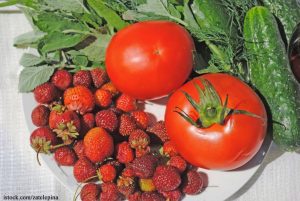Earlier this month, the Partnership for Food Safety Education held a webinar on handling produce safely. Since Salmonella-contaminated produce is in the top five pathogen-food combinations that cause food poisoning outbreaks, knowledge is critical.
 Ashley Eisenbeiser of the Food Marketing Institute spoke about the numbers. Produce is responsible for 46% of reported foodborne illness outbreaks from 1998 to 2008, and caused 23% of deaths in those outbreaks. Overall, leafy vegetables cause 8% of those illnesses. Of outbreaks attributed to produce, 30% are caused by cross-contamination, and 40% to poor personal hygiene; the rest are contaminated at the source. Sixty-eight percent of outbreaks attributed to produce are from food purchased from a restaurant or deli, 9% from private homes, 7% from caterers, and 5% from institutions.
Ashley Eisenbeiser of the Food Marketing Institute spoke about the numbers. Produce is responsible for 46% of reported foodborne illness outbreaks from 1998 to 2008, and caused 23% of deaths in those outbreaks. Overall, leafy vegetables cause 8% of those illnesses. Of outbreaks attributed to produce, 30% are caused by cross-contamination, and 40% to poor personal hygiene; the rest are contaminated at the source. Sixty-eight percent of outbreaks attributed to produce are from food purchased from a restaurant or deli, 9% from private homes, 7% from caterers, and 5% from institutions.
Unfortunately, the food that is contaminated is only identified in about half of all food poisoning outbreaks. Investigation into outbreaks is costly, time consuming, and very difficult.
Produce can be contaminated anywhere from the farm to the fork. Bacteria is found naturally in soil or water where the produce grows. Runoff from farms, contamination from animal contact, contaminating during harvest and shipping, and problems with storage and handling can all cause contamination.
While consumers are concerned about risks, many people aren’t taking the necessary steps to prevent illness from produce. Clean your kitchen often; wash your hands frequently; and avoid cross-contamination. And remember that when you use reusable bags for shopping, only use them for food, not for books, pets, or gym equipment.
There are six steps for making sure the produce you serve your family is safer. Consumers are the last line of defense in preventing foodborne illness, so education is crucial.
First, check for bruising and damage. Know what is normal and what is not in produce. Bruising and damage gives pathogenic bacteria an entry into the fruit or vegetable. Once the interior is contaminated, no amount of washing is going to make that food safe. If you are going to try a new fruit or vegetable, learn what it should look like.
Second, pre-cut fruits and veggies should always be on ice or refrigerated. Temperature control is the only way to delay microbial growth. When produce is cut, it releases moisture, which creates an ideal breeding ground for bacteria. In addition, cutting produce transfers bacteria from the surfaced to the interior. Avoid the danger zone: 40° to 140°F. Bacteria double in number in 20 minutes when the food is between those two temperatures.
Third, make sure your hands, preparation surfaces, and utensils are clean. Always wash hands with soap and warm water before you prepare food, after handling raw meats or eggs, and before you eat.
Fourth, rinse your food before you eat. The temperature of the water doesn’t matter. Just get that fruit or veggie under running water. Scrub firm produce with a clean brush. The scrubbing action removes contaminates.
Fifth, make sure you separate foods that are to be eaten uncooked from any raw meat, seafood, poultry, or eggs. Cross-contamination in the home is a major cause of foodborne illness.
And finally, throw away anything that you aren’t sure about. When in doubt, throw it out. You cannot see, smell, or taste bacteria that cause food poisoning.
Finally, Ms. Eisenbeiser said that there are two incorrect “outlier” messages that food safety educators are telling their clients. Fifty-two percent of educators tell consumers to wash bagged, pre-washed product. And almost 14% encourage consumers to use a produce wash when cleaning fruits and veggies. Those two messages are incorrect, and inconsistent with FDA advice and scientific literature. Ready to eat, triple-washed lettuce is safe. Rewashing doesn’t increase safety but increases cross-contamination. Water is just as effective as veggie washes, vinegar solutions, or detergent.




